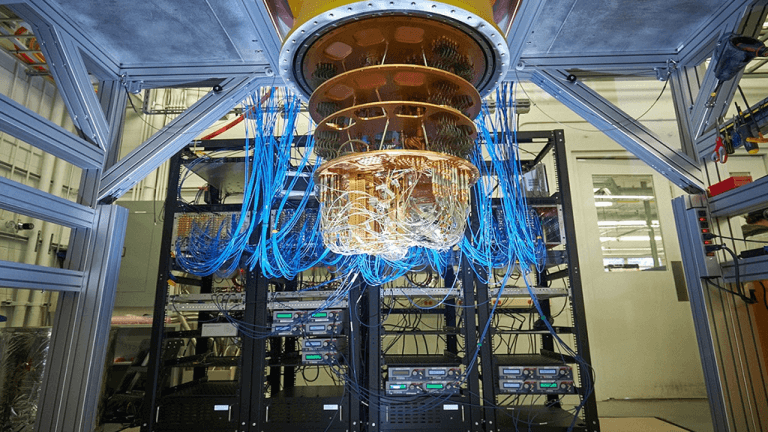
The chief executive of stablecoin issuer Tether (USDT) says that quantum computing will allow hackers to steal Bitcoin (BTC) from lost wallets. In a new thread on the social media platform X, Tether CEO Paolo Ardoino predicts that while active crypto users may move their funds to quantum-resistant wallets, those who have abandoned or lost […]
The post Tether CEO Paolo Ardoino Says Quantum Computing Will Allow Hackers To Take Bitcoin From Lost Wallets appeared first on The Daily Hodl.
 The National Institute of Standards and Technology (NIST) said it will deprecate ECDSA after 2030. Government to Deprecate Bitcoin Signature Cryptography The cryptography underpinning Bitcoin’s digital signatures – Elliptic Curve Digital Signature Algorithm (ECDSA) – will be deprecated by the government after 2030, and some bitcoiners are urging the community to saddle up and find […]
The National Institute of Standards and Technology (NIST) said it will deprecate ECDSA after 2030. Government to Deprecate Bitcoin Signature Cryptography The cryptography underpinning Bitcoin’s digital signatures – Elliptic Curve Digital Signature Algorithm (ECDSA) – will be deprecated by the government after 2030, and some bitcoiners are urging the community to saddle up and find […]

The post-quantum era is still “several decades away,” but it could be a net positive for the Bitcoin network’s security.
Advancements in quantum computing have the potential to strengthen the Bitcoin network in the coming decades, even though there are widespread concerns about the technology’s ability to compromise cryptographic encryption.
Industry insiders have previously voiced concerns that quantum computing may break cryptographic algorithms in the future, thanks to its ability to perform computational processes at previously unimagined speed, thanks to advancements in quantum physics.
Yet despite these concerns, quantum computing could lead to a stronger Bitcoin (BTC) network, according to Adam Back, co-founder and CEO of Blockstream, the inventor of Hashcash and one of the most notable cryptographers in the industry.
 Following discussions about Google’s latest quantum computing chip, speculation is rife that Bitcoin’s days are numbered and its cryptography is at risk of being compromised. Google’s Willow Chip Launches Heated Bitcoin Discussions On Monday, the CEO of Google and its parent company, Alphabet Inc., Sundar Pichai shared an X thread introducing Willow, a cutting-edge quantum […]
Following discussions about Google’s latest quantum computing chip, speculation is rife that Bitcoin’s days are numbered and its cryptography is at risk of being compromised. Google’s Willow Chip Launches Heated Bitcoin Discussions On Monday, the CEO of Google and its parent company, Alphabet Inc., Sundar Pichai shared an X thread introducing Willow, a cutting-edge quantum […]

The new hardware could ultimately host a theoretical algorithm with the potential to transform proof-of-work.
Microsoft and Atom Computing, a technology firm based in California, recently announced a breakthrough in quantum computing that could pave the way for a proof-of-work transformation in the world of blockchain mining.
Scientists and engineers from the two companies developed a quantum computing system made up of 24 entangled logical qubits produced by just 80 physical qubits — a feat that sets a new record for the highest number of entangled logical qubits achieved using error correction techniques.
The significance of this scientific breakthrough is in the teams’ achieved efficiency. Previous estimates have indicated that it could take thousands of physical qubits working in tandem to produce a single logical qubit.

Bitcoin’s private keys won’t be breached any time soon. But the industry still needs to transition to a “post-quantum cryptography.”
A report that Chinese researchers have employed a D-Wave quantum computer to breach encryption algorithms used to secure bank accounts, top-secret military data and crypto wallets is at first glance a matter for deep concern.
“This is the first time that a real quantum computer has posed a real and substantial threat to multiple full-scale SPN [Substitution-Permutation Network] structured algorithms in use today,” wrote Shanghai University scientists in a peer-reviewed paper, according to the South China Morning Post (SCMP) on Oct. 11.
The paper talks about breaking RSA (Rivest-Shamir-Adleman) encryption, one of the oldest and widely used public-key cryptosystems.

Quantum bits currently require temperatures between approximately -200 degrees Celsius to -270 degrees Celsius to operate properly.
Researchers at Shangai University recently made headlines for purportedly breaking the RSA encryption algorithms used in banking, military, and cryptocurrency applications. However, popular YouTuber Mental Outlaw says the recent breakthrough in China lacks the power to impact current encryption standards due to severe computation and physical limitations.
According to the research paper, the quantum computer used in the experiment factorized the integer 2,269,753. Mental Outlaw noted that this surpassed records set by other quantum computers but failed to surpass the record set by classical computers.
The YouTuber clarified that the quantum computer only broke a 22-bit key. For context, the record set by classical computers was cracking an 892-bit key, which required a whopping 2,700 physical core years to break.

Reddit’s Bitcoin community remains optimistic about BTC, but members are still eager to discuss the most valid concerns regarding Bitcoin's future.
Bitcoin (BTC) has achieved significant success since its inception, but some within the community remain concerned about its future.
On Sept. 14, a Redditor on the Bitcoin subreddit appealed to the community with a question on the most legitimate concerns about the future of BTC.
What scares you the most about Bitcoin’s future? Source: Reddit

Scientists are using quantum algorithms to uncover new insights into how our brains learn and apply information.
Quantum computers are often referred to as a future technology that will give scientists and engineers a new tool with which to explore the deeper mysteries of the universe. But, based on a new study, they may end up making the whole species a little smarter.
A team of scientists in South Korea recently used a quantum computer to conduct research on how humans retain and retrieve information. This pioneering study could pave the way for new learning techniques to improve outcomes in fields such as science, mathematics, and finance.
There are numerous forms of quantum computing, though the industry remains in its infancy. Companies such as Google and IBM are heavily involved in developing what’s called “gate-based” quantum computers. These systems work in a somewhat similar fashion to modern digital circuits.

World-renowned futurist Ray Kurtzweil says the singularity is coming sooner than expected.
Everyone from Elon Musk to the CEO of Google DeepMind has predicted that artificial intelligence will surpass human intelligence within a matter of decades. This scenario is often referred to as the AI singularity.
Big tech, academia, and governments around the world have started workshopping potential scenarios to deal with this hypothetical moment. While much has been written about the threat of a violent AI takeover, there’s little in the way of research concerning how a machine could corner the global economy.
Futurist Ray Kurzweil, a former Google researcher who’s considered a luminary in the field of technology, recently published a book entitled “The Singularity Is Nearer: When We Merge with AI.” In his text, he discusses what he views as our imminent future as the second-smartest beings on Earth.